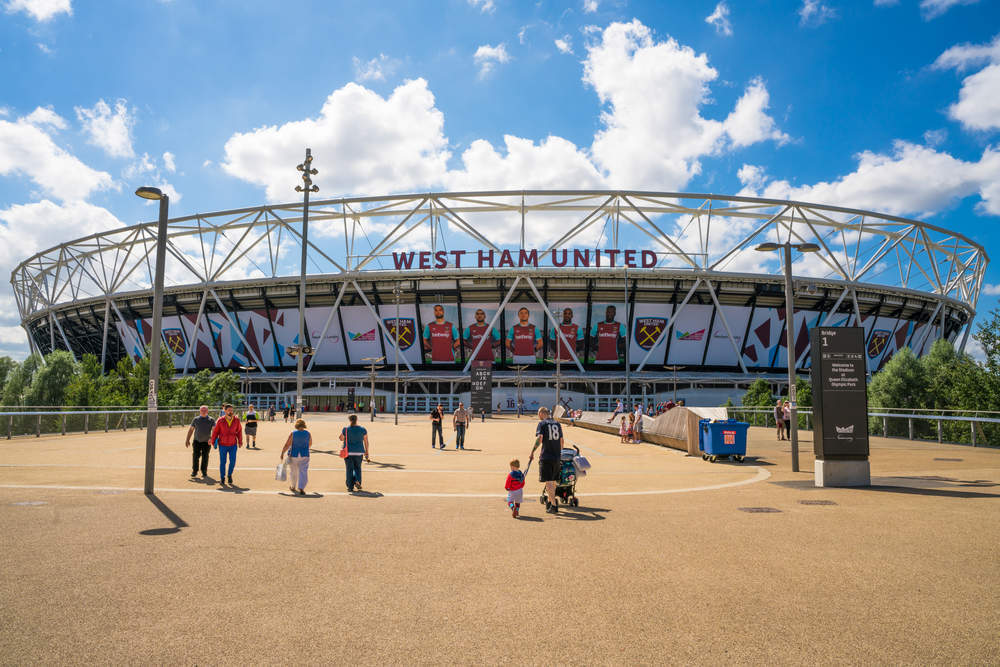
West Ham United owners David Gold and David Sullivan looked troubled as they walked away from their seats at the London Stadium during their club’s 3-0 defeat by Burnley.
The reason for their troubles may not have just been the loss on 10 March, which marked just another disappointing result for the London club and left them three points above the relegation zone, but the four fans who invaded the pitch in protest during the game.
Although this was the first case of pitch invasion, is the latest sign of widespread discontent among the club’s supporter base. Earlier this year, a number of fans groups scheduled a march through the London area of Stratford, where the Olympic Stadium is located, which was later called off.
Last February, 15 supporter groups representatives held meetings with the board, which managed to achieve temporary truces.
Yet things deteriorated during the match against Burnley, when four fans ran on the pitch in different occasions, while others standing next to the owners’ box allegedly hit Sullivan with a coin, forcing him to seek shelter.
As a response, the club invited members of the Supporters’ Advisory Board for an emergency meeting at the London Stadium to be held on Monday 26 March.
The club also said in a statement on Wednesday:
West Ham United are committed to taking decisive and positive action with the primary focus of ensuring London Stadium is a safe, comfortable and secure environment for supporters attending future matches. Any individual found guilty will be banned from attending any West Ham United fixture, home and away, for life.
As fans pursue their protests against Gold and Sullivan for failing to invest in the football transfer market and changing West Ham’s home from the Boleyn Ground to the Olympic Stadium, the Premier League club is risking a possible financial backlash.
The club has created “unrealistic expectations”
“The problem has arisen due to poor use of communication and creating unrealistic expectations in the eyes of the fans,” Kieran Maguire, football and finance Professor at the University of Liverpool, told Verdict.
He explained that when Sullivan and Gold took over of the club two years ago, they persuaded supporters that moving to a new ground would make the club more competitive in the transfer market. He said:
“The fans have been sold a story, which hasn’t proved to come to fruition and that’s why they’re angry.”
But while until last week there had been mainly verbal complaints, the latest actions have forced the owners to make changes, the first being the introduction of more stewards at the London Stadium.
Raffaele Poli, a researcher at the International Centre for Sports Studies (CIES), told Verdict:
The fact that they are forced to improve their security measures already looks like a failure to me…It is a move that worked in the past but could fail to work in West Ham’s case, though the club is probably now counting on the fans’ sense of responsibility, considering that the team could be heavily penalised in case new problems come up.
If the club can’t control its fans it could face sanctions from the Football Association under rule E20, which carries a standard penalty of £20,000 or £30,000 if the charge is not admitted. In extreme circumstances the FA could even force West Ham to play to an empty stadium.
In 2010 the FA fined West Ham £120,000 for failing to control its fans at former venue, the Boleyn Ground, after violence at a Carling Cup match against Millwall the previous year.
Within this framework, the local council-run London Stadium Safety Advisory Group (SAG) met last Thursday to discuss the options and said in a statement:
The SAG must make clear that in the event of future disorder, it would seriously consider advising the certifying authority to take forward this sanction.
Playing behind closed doors would be a great shame for the majority of fans who wish to watch and support their team in safety.
Counting the cost to West Ham of possible lost ticket sales
With average attendance of 57,000, and adult ticket prices ranging from £25 to £80, West Ham would lose millions of pounds in gate receipts if it was forced to play to empty stadiums.
This could trigger other negative consequences. Firstly, according to Professor Maguire, fans would get even angrier.
He said:
Many of these people have watched West Ham throughout generations and some of them have not missed a game in ten or 20 years.
Football fans have their lives disrupted as it is due to the constant scheduling of kick-off times, and now if you’re going to deny them the opportunity to support the team that has been part of their lives throughout the years there will be a backlash.
This would not only result in frustration for the fans and demotivation for the squad, but would also have severe repercussions for the club’s overall brand.
“The knock-on effect is that sponsors and commercial partners are going to be concerned because they will see West Ham as a damaged brand and therefore won’t want to be associated with it,” Professor Maguire said, adding that pre-season tours overseas could be equally compromised.
The biggest financial hit for West Ham to come from the club’s current troubles would be relegation, which bookies are currently pricing at 5/2.
Economist Shaun Richards said: “[Relegation] would be the worst possible financial scenario for West Ham, which would lose the money coming from the TV rights and would have several problems surviving with only the parachute payments.”
The cost of relegation for a club from the Premier League has been estimated at in excess of £50m.
For him, the solution for the club is to invest in the transfer market: “Gold and Sullivan need to buy more players during the summer, because although they have a lot of money they are not keen on spending as much as the fans want them to.”
Leaving the London Olympic Stadium is not an option for West Ham
Moving ground – no matter how unpopular it is with the fans – is not an option, according to Professor Maguire,
“West Ham has no choice but to carry on and play at the London Stadium,” he said.
It is now a case of reaching some form of compromise between all of the stakeholders; the most equitable solution would be for somebody to come and buy the club and start with a clean slate.
He believes that a change in ownership would be successful considering Sullivan and Gold’s damaged reputations:
They want to be seen as local lads who rescued the club when the reality is they’re pretty smart businessmen who have done well to the club to an extent but they made a lot of money out of it themselves.







